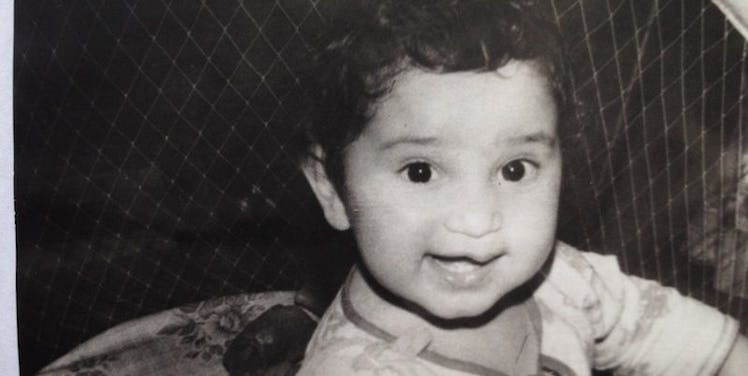
I Was Born With A Cleft Lip And It's No Less Perfect Than Your Lips
I was an extra-sheltered child. I didn't learn how to ride a bike until I was 16. I wasn't allowed to sleep over at anyone's house without express permission until college. I still don't know how to swim.
I also didn't know I had a cleft lip -- a birth defect in which a baby's lip does not form properly, leaving a split or opening -- until I was 17.
I mean, I'm not blind. I knew something was wrong at a young age. My smile looked different from those around me. I always looked like I was on the verge of saying something. My family gave me different excuses out of a desire to protect me at a delicate age.
"You were drinking from a glass bottle and it broke in your hands."
"You fell off a slide when you were little and cut yourself on the rocks below."
Because I heard these stories so many times, I didn't question them. In fact, I believed them so much I could've sworn I remembered my uncle carrying me back home that day I fell off the slide.
My family made sure no one knew, not even me.
There are no photos of me as a newborn. No one in my family wanted to remember what I looked like prior to my surgery or that there was ever a tear in the skin between my upper lip and nose. The earliest photos of me were taken when I was around four-months-old, after my reconstructive surgery was completed.
In order to ensure no one, except for our immediate family and very close friends, knew of my childhood deformity, my mother made sure I was never seen without a pacifier or baby bottle in my mouth. No one asked questions. Besides, I'm sure I was still a super cute baby.
"What's wrong with your lip?"
I didn't realize there was something inherently wrong with my face until my family moved to America.
Kids don't need an excuse to bully one another, and when they find one, they will never let it rest. I was constantly reminded of my irregular face by other children. Similarly, adults would shoot worried glances my way when they caught a glimpse of the fading red scar under my nose.
Although my closest friends never mentioned the fading stitches, they weren't able to protect me from the kids who did. My front teeth grew in awkwardly and, as a result, straws always looked awkward in my mouth.
I was labeled a "leper."
Eventually, that initial fear -- did they think I was going to bite them? -- turned into curiosity. I'd field questions such as:
"Does it hurt?"
"Will you ever even it out?"
"Do you feel it when you touch it?"
No, maybe and obviously, yes.
Plastic surgeons didn't want to touch it.
When I was 17 and felt particularly sh*tty about myself, I asked -- okay, demanded -- to see a plastic surgeon who could "fix" my lip. My mother reluctantly agreed and we made an appointment to see a top cosmetic surgeon affiliated with Lenox Hill.
The morning of our consultation, my mother cornered me in my room.
"I want to tell you before the surgeon tells you himself. You were born with a cleft lip."
Cut and dry. How very Russian.
"But what about the bottle?"
"Did you seriously think I would let my own daughter drink from a glass bottle as a baby?"
Tears followed. I felt hurt and betrayal, but not anger. I got why she and my family hid the truth from me. When my stepfather found out, he immediately donated to a charity supporting cleft lip and cleft palate operations in various underprivileged parts of the world. It seemed my family had been supporting my condition for years, unbeknownst to me.
After our initial consultation (and plenty of poking and prodding) the surgeon laid down the hard facts. He said he could try to fix the irregularity in my lip, but he couldn't promise anything. Turns out, a couple of millimeters worth of work was too risky and could lead to an even more noticeable scar. Fantastic.
He also said he doubted many surgeons would undertake the task and the ones who would may not do it justice. It would require the work of an artist to fix this, not a surgeon.
A scar -- even in the middle of your face -- doesn't make you any less perfect.
I've preached about how freckles, curves and mastectomy scars in no way impair your claim to beauty. I based my career on making every woman believe she is jaw-dropping in her own skin. Yet, I'm still working on feeling that way about myself.
It's not a confidence issue. I love myself, curves, scars and all. My lip, however, always felt out of place for me. I'm always scared a date might notice it and not want to kiss me. I'm worried my four-year-old little sister will think I'm ugly. I always exaggerate my Cupid's bow when applying lipstick because I don't want my lip to be the first thing someone notices about me. I rarely wear reds and berry tones for that very reason.
Every once in a while, someone will notice. One person messaged me on Tinder asking, "What's up with my lip?"
At the end of the day, my lip -- my uneven, botchy lip -- makes me who I am. It's not perfect, but it's hardly a flaw, either. I know I'm incredibly lucky to have had a surgery to rectify it, as so many people in the world aren't able to do the same.
Beauty might be in the eye of the beholder, but I still like to think it's all about the lips. Hey, none of my dates have ever complained.